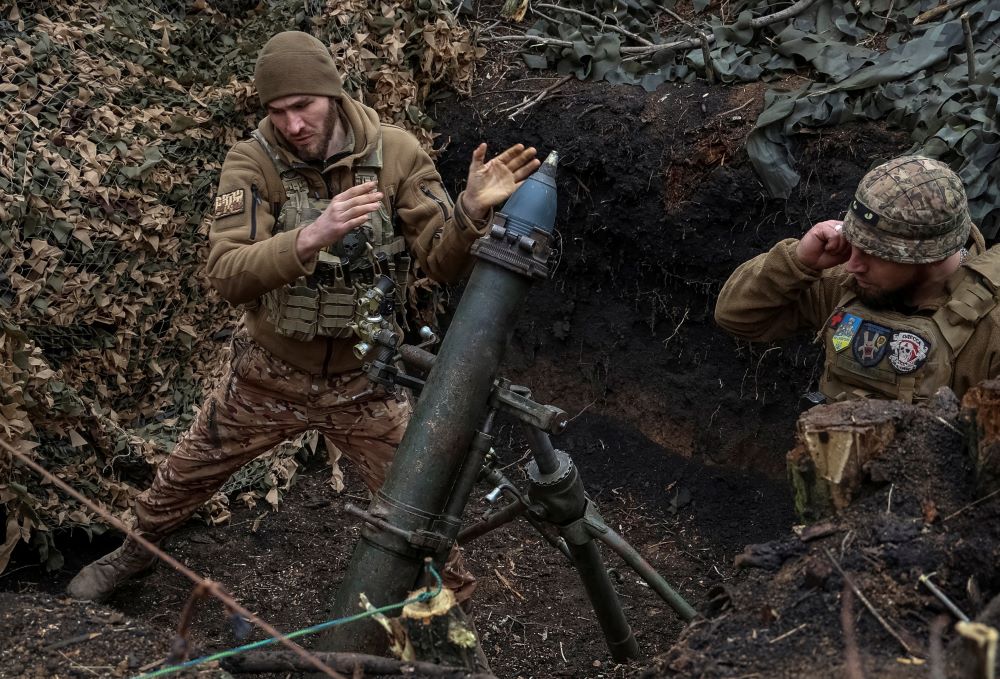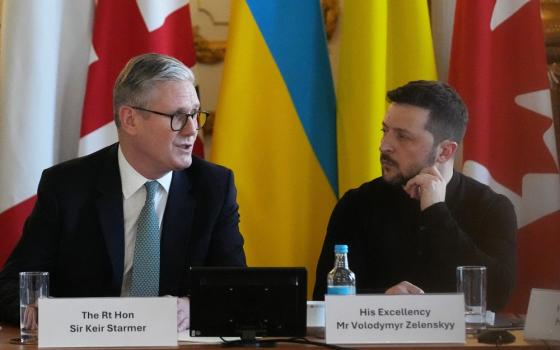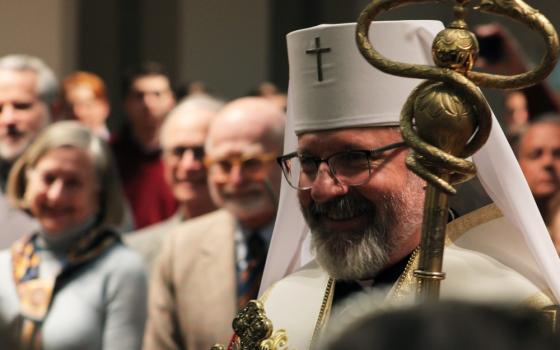
Ukrainian members of the 28th Separate Mechanized Brigade fire a 120-mm mortar toward Russian troops at a frontline, amid Russia's attack on Ukraine, near Bakhmut, Ukraine, March 15. (OSV News/Reuters/Oleksandr Ratushniak)
We had several dozen planned meetings and interviews with church groups, public officials, journalists, artists, soldiers and students during our two-week visit to Ukraine last month. But sometimes it is the unplanned meeting that is the most memorable.
A nighttime taxi ride in the city of Lviv, in western Ukraine, was particularly moving. We were returning to Ukrainian Catholic University after meeting some aid groups for dinner. When we got to the university, one member of our group, Eric Trupin, a psychologist from Seattle, discovered that he had left his backpack at the downtown restaurant.
So, we asked the taxi driver to turn around and take us back downtown. The longer trip gave us a chance to talk to our driver, who appeared to be a young man, about 30 years old. He told us that an artillery explosion of some kind had disabled his legs. He had been fighting near Bakhmut, a city of 70,000 residents before the full-scale Russian invasion Feb. 24, 2022. Today, the city is deserted. A nine-month siege by the brutal Russian mercenary army, the Wagner Group, reduced it to rubble. Thousands of civilians were forced to flee. Tens of thousands of soldiers on both sides were killed. Eventually Ukraine had to retreat a few miles from Bakhmut, but the end result of the battle was to severely degrade the Russian forces, which took huge losses.
We communicated with our driver through the miracle of the Google Translate app on our smartphones. He spoke Ukrainian. We spoke English. The phone translated. It was awkward, but effective.
Our driver asked where we were from. We answered "America." He was suddenly delighted and grew emotional in his thanks for the military aid that America had already sent. He said, "Thank you Americans for your help. In Bakhmut, we used your artillery shells."
We met a traumatized man in a traumatized nation.
The nine-month siege by the Russians and the massive Russian artillery barrage was horrible, he said. But the waves of suicide attacks by the Wagner Group, made up largely of conscripts released from Russian prisons, was worse. The Wagner Group was notorious for its brutality. Today they no longer exist, after their leader led a mutiny against Putin.
On our trip back downtown, the driver started to criticize his own government. He said he felt abandoned by his government with no pension or benefits, not even health care. "After fighting in Bakhmut, can you imagine that I am driving a taxi? I can hardly support my wife and children." He was bitter. (I have since found out that he is eligible for some health care.) But his attitude reflected the experience of wounded veterans everywhere, who feel abandoned by their governments. His injuries were not just physical but psychological. He wanted to stress to us that he had been on the front lines and had seen the worst of the fighting.
At one point, he handed us his cellphone, to show us a gruesome two-minute video of the aftermath of the battle. "This is my work," he said. Our driver's voice could be heard narrating a walk through a dense birch and pine forest. Dead bodies, clothed in military camouflage with Russian flags and Wagner Group insignia, lay on the ground. I counted six dead. All had fallen in unnatural positions, as if they were running at full gallop when they were hit by bullets and forced backward. It was a frightening scene.
I later asked Trupin, "Why would he show this video to complete strangers?" He said the driver was probably suffering from PTSD. Part of dealing with trauma is to talk about it, many times, until the person experiencing trauma can put it into some frame of reference. It never leaves you, but you can begin to make some sense of it.
Advertisement
The driver wanted us to know about the impact the war had on him in particular and his country in general. He wanted someone from abroad to be aware of the horrible reality of the war. In a way, he was proud of what he had done. He was, after all, defending his country from an unjust and cruel invasion.
When we got to the university, we decided that we should thank the guy for his service to his country and to a just cause. We pooled our cash and gave him a $150 tip in U.S. dollars. We told him in fractured Ukrainian, "Thank you for your service."
He was overwhelmed. "Wow! Thank you," he said several times in English. We had come to Ukraine to learn about the collective trauma of the nation. A nighttime taxi ride brought us face to face with one casualty of the war. It was a brief encounter, but it left an impact on me.
We met a traumatized man in a traumatized nation.






